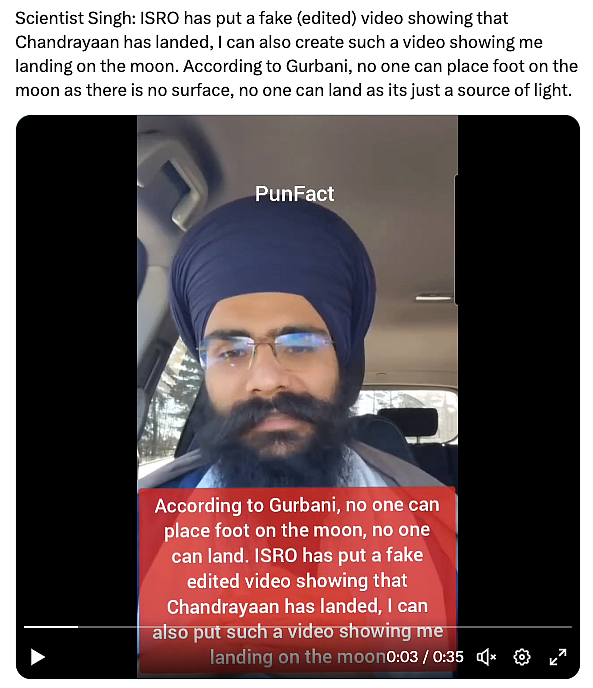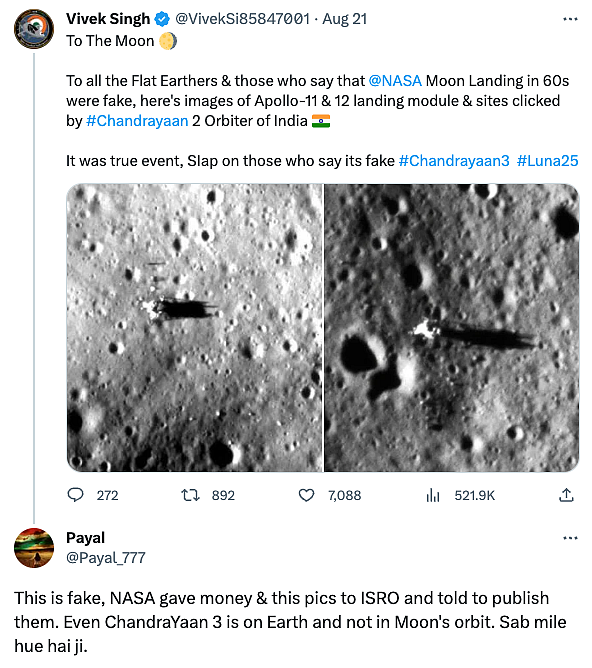As Indians came together to celebrate the historic landing of the Indian Space Research Organisation’s (ISRO) Chandrayaan-3 mission, a section of the internet was found shaking their heads in denial.
Right after ISRO released the video of the Vikram lander touching down on the moon, we found conspiracy theories challenging it on different social media platforms, such as ISRO got the photographs of the moon from the National Aeronautics and Space Administration (NASA) or that mood doesn't have a surface to land on.
Conspiracy theories around moon are not new and have been around since the Apollo 11's moon landing in 1969.
(Swipe right for more.)
And then there were aliens.
This video, for instance, claims that the rover spotted extraterrestrial life forms “and their children, who were playing”. It claims these “aliens” ran away at the sight of the craft.
A recent study has now attempted to find a reason behind why people share these unfounded theories and posts around hot topics – "need for chaos".
The research paper, titled ‘By any memes necessary: Belief- and chaos-driven motives for sharing conspiracy theories on social media’, was authored by Christina Farhart, Erin Fitz, Joanne Miller, and Kyle Saunders. It looks into the motives of people sharing conspiracy theories on social media.
The study explored the impact of three different motives for people to share conspiracy theories, which were:
Bolstering their or their group’s beliefs (motivated sharing)
Generating collective action against their political outgroup after losing (sounding the alarm)
And mobilising people against a political system (need for chaos)
With a sample of 3,336 American adults, the researchers found strong evidence supporting the need for chaos as a motivator in people, but did not find any behind “sounding the alarm.”
The findings suggested that motivated sharing – which involved sharing theories that reinforce an individual’s or group’s beliefs – was the strongest predictor of people’s willingness to share conspiracy theories on social media.
For instance, after fires ravaged Hawaii’s Maui island, posts claiming that the fires had been started using directed energy weapons cropped up on social media. These posts carried images of beams of light travelling in a straight line between the ground and the sky.
Yet again, these images weren’t recent ones, neither were they from Hawaii. They showed different incidents, both of which happened in 2018.
But debunking this claim didn’t put a stop to conspiracy theories surrounding the fires.
Social media users went on to claim that celebrities with homes on Maui had painted their properties a specific shade of blue, implying that the weapons that started the fire had skipped these houses and not burned them.
The study explains this behaviour, too. In their results, the researchers found that people who felt the need for chaos tended “to share all conspiracy theories”.
It added that while sharing theories on social media could mobilise people and reinforce beliefs, the motivation behind pushing conspiracy theories was to “disrupt the entire system, rather than rally one’s partisan ingroup against the outgroup.”
“Although earlier work found a positive relationship between the need for chaos and sharing (and that the need for chaos superseded partisan motivations for sharing) these studies did not assess how the need for chaos affected sharing when pitted against a direct measure of conspiracy theory belief,” the researchers told PsyPost, a website which reports about research on human behavior, cognition, and society.
Elaborating on the “need for chaos” as a motivator, the study stated that while this need was not as strong a motivation as belief in a conspiracy theory or a narrative, it consistently surpassed “beliefs” when the motivation was to disrupt or challenge a system.
The researchers aimed to assess whether people with a higher need for chaos were more likely to share conspiracy theories on social media, regardless of whether they believed the theories or if they aligned with their partisan views, with the help of an eight-point scale.
After controlling variables like age, education, religious beliefs, income, race and more, the study confirmed that the need for chaos was “positively associated” with the willingness to share conspiracy theories. Additionally, it found that people were more willing to share such content if they believed in the theory themselves.
“These findings contribute to our understanding of why people share conspiracy theories by suggesting that, whereas some individuals share specifically to impugn political rivals, others do so to challenge the entire political system,” Psypost reported the researchers as saying.
Surprisingly, the researchers did not find a significant connection between sharing conspiracy theories on social media and partisanship or ideology.
The study, however, has its own caveats. Researchers said that the sample was not nationally representative, and that the study was observational. Mentioning that it would be "unethical to experimentally induce chaotic motives," they only studied existing human behaviour.
This, in turn, prevented them from conclusively determining causality between the motivation, belief systems and the action of sharing conspiracy theories on social media.
(Not convinced of a post or information you came across online and want it verified? Send us the details on WhatsApp at 9643651818, or e-mail it to us at webqoof@thequint.com and we'll fact-check it for you. You can also read all our fact-checked stories here.)
(At The Quint, we question everything. Play an active role in shaping our journalism by becoming a member today.)




